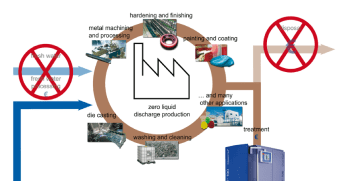
Introduction
As the world grapples with escalating environmental challenges and the need for sustainable industrial practices, the future of wastewater management is at a crossroads. Advanced vacuum evaporation technologies have emerged as a beacon of hope in this landscape, offering remarkable potential for revolutionizing how industries treat and manage wastewater. In this blog, we will peer into the crystal ball of innovation to explore the future of vacuum evaporators, their potential advancements, integration with renewable energy sources, and their evolving role in wastewater treatment.
Advanced Vacuum Evaporation: A Glimpse into Tomorrow
a) Enhanced Energy Efficiency: The future of vacuum evaporators will undoubtedly see even greater strides in energy efficiency. Researchers and engineers are continually developing improved heat exchange systems, more efficient vacuum pumps, and advanced materials to optimize energy consumption. This evolution will make vacuum evaporators an even more sustainable choice for wastewater treatment.
b) Intelligent Automation: Artificial intelligence (AI) and machine learning will play a significant role in the future of vacuum evaporation. Smart, AI-powered control systems will enhance the automation of these systems, enabling real-time monitoring, predictive maintenance, and adaptive operation based on varying wastewater characteristics. This will not only improve efficiency but also reduce the need for manual intervention.
c) Integration with Renewable Energy: One of the most promising advancements on the horizon is the integration of vacuum evaporators with renewable energy sources. Solar thermal systems, for instance, can provide the heat requiredfor evaporation, reducing the reliance on conventional energy sources. This integration aligns with the global shift toward clean energy and sustainable practices.
d) Customization and Scalability: Future vacuum evaporators will likely offer greater customization and scalability options. Industries will be able to tailor these systems to their specific wastewater characteristics and treatment goals, whether it’s achieving Zero Liquid Discharge (ZLD), recovering valuable materials, or reducing disposal costs.
e)Resource Recovery: Resource recovery from wastewater will become a central theme in wastewater management. Advanced vacuum evaporators will be equipped with sophisticated separation technologies that can extract valuable resources, such as metals, salts, and solvents, from concentrated residues, contributing to resource conservation and sustainability
f)Decentralized Solutions: The future may witness the proliferation of decentralized vacuum evaporator systems. These compact, modular units can be deployed closer to the source of wastewater generation, reducing the need for extensive piping and infrastructure. This approach can be particularly beneficial for industries in remote areas or those with limited space.
The Evolving Role in Wastewater Treatment

a) Environmental Stewardship: Vacuum evaporators will continue to play a pivotal role in environmental stewardship, allowing industries to minimize their impact on water bodies and ecosystems. Achieving ZLD and reducing pollutant discharge will remain key objectives.
b) Sustainability: Vacuum evaporators will become synonymous with sustainability. Integration with renewable energy sources, resource recovery, and reduced energy consumption will position these systems as environmentally responsible choices.
c) Cost-Effectiveness:Industries will increasingly rely on vacuum evaporators for their adaptability. These systems will be capable of handling diverse wastewater streams, meeting the evolving needs of different sectors.
d) Adaptability:Industries will increasingly rely on vacuum evaporators for their adaptability. These systems will be capable of handling diverse wastewater streams, meeting the evolving needs of different sectors.
Conclusion
The future of wastewater management lies in the hands of advanced vacuum evaporation technologies. These systems will evolve to be more energy-efficient, intelligent, and integrated with renewable energy sources. They will play a vital role in resource recovery, environmental stewardship, and cost-effective wastewater treatment. As industries across the globe commit to sustainable practices and environmental responsibility, vacuum evaporators are poised to become indispensable tools in the journey toward a cleaner, greener, and more sustainable future for wastewater management.
